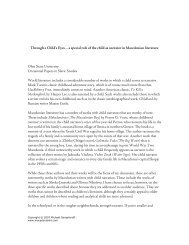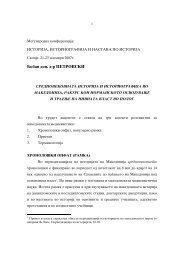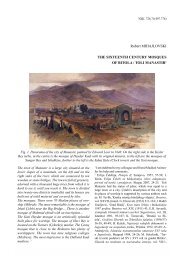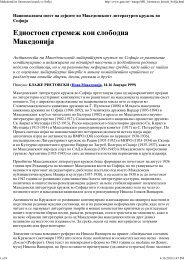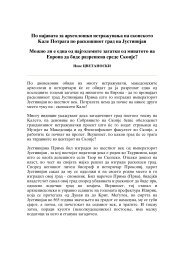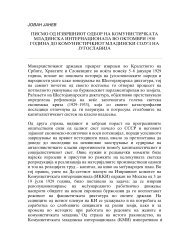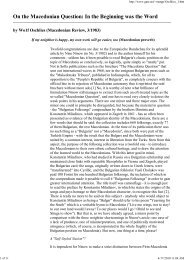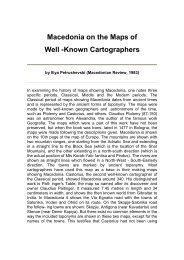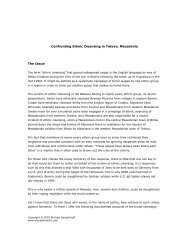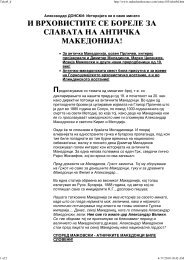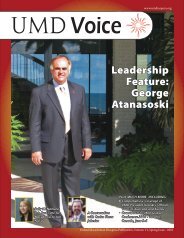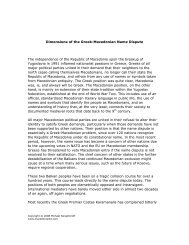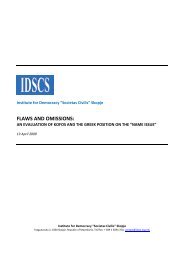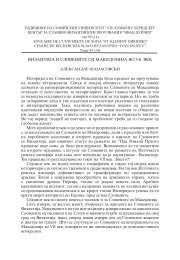Macedonian State-National Concepts and ... - Makedonika
Macedonian State-National Concepts and ... - Makedonika
Macedonian State-National Concepts and ... - Makedonika
Create successful ePaper yourself
Turn your PDF publications into a flip-book with our unique Google optimized e-Paper software.
Americans “with our ethnic <strong>and</strong> historical rights”, i.e. “with our ethnographic<br />
borders <strong>and</strong> our goals in this bloody struggle”. The following instructions were<br />
given:<br />
14.<br />
With the purpose of making it possible, at least from now on, for our writers <strong>and</strong><br />
journalists as well as ordinary citizens to have consistent <strong>and</strong> definite views in private<br />
conversations of the ethnographic borders of our people, <strong>and</strong> also of our other<br />
ethnographic, ethnic <strong>and</strong> national questions, it is my honour, Mr Envoy, to invite<br />
the professors of our university, Dr CvijiÚ, Dr BeliÚ, Dr ÛeriÚ, Dr RadonjiÚ <strong>and</strong><br />
Dr StanojeviÚ, <strong>and</strong> request them together to draw up the ethnographic borders of<br />
our three-named people in all the regions, paying special attention to the borderline<br />
with the Bulgarians <strong>and</strong> Greeks, where the most frequent errors are being made.<br />
Yet more <strong>and</strong> more information arrived concerning the opinion of the <strong>Macedonian</strong>s<br />
themselves about their future following the war. Serbian representatives<br />
could also feel this. It was not by chance that as early as the spring of 1918 the<br />
allies started once more to use the ‘<strong>Macedonian</strong> question’ <strong>and</strong> Bulgaria’s aspirations<br />
on the approaching end of the war. As a result, on March 2, 1918, the Serbian<br />
diplomatic representative in London, Jovan JovanoviÚ, proposed to his government<br />
that it should not only leave nothing to Bulgaria under any condition, but that it<br />
should accept the border line of 1912 <strong>and</strong> dem<strong>and</strong> that the people from the<br />
“disputed zone” vote in a referendum whether they wanted to go with the Serbs or<br />
Bulgarians. What is particularly interesting, JovanoviÚ suggested that “autonomy<br />
be proposed for Macedonia (the old vilayets — Bitola <strong>and</strong> Salonika — the latter<br />
without the Veles district)”, <strong>and</strong> that “the question be put before scholarly arbitration<br />
or before a mixed special commission”.<br />
It is interesting that as early as 1917, in the negotiations with the Entente<br />
concerning a separate peace with Bulgaria through the mediation of the Exarchate<br />
metropolitan Stephen, it was agreed that “Macedonia should be proclaimed an<br />
autonomous region with Salonika as its capital, under the protectorship of America”.<br />
A similar proposal was made by the <strong>Macedonian</strong> Bombolov in London, in<br />
July 1918, for the autonomy of Macedonia, <strong>and</strong> the idea was accepted favourably<br />
by the British as well.<br />
In August 1918, special representatives of the American president Wilson<br />
arrived in Bitola to become acquainted with the ethnography of the population on<br />
the spot. Here we must take into account the claims of Greece which were<br />
expressed through several concrete actions in Macedonia. PašiÚ’s minimal <strong>and</strong><br />
maximal claims to Macedonia from April that year seemed to be called into<br />
question. Coming out against “the public discussion of the <strong>Macedonian</strong> question”,<br />
260



